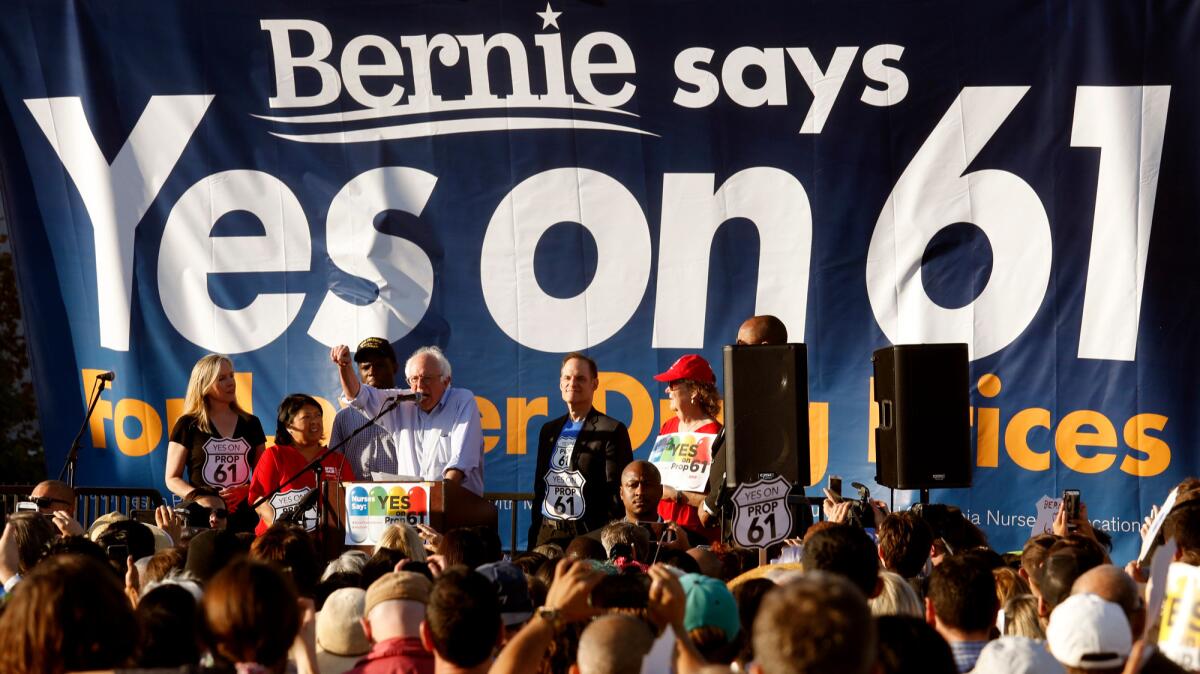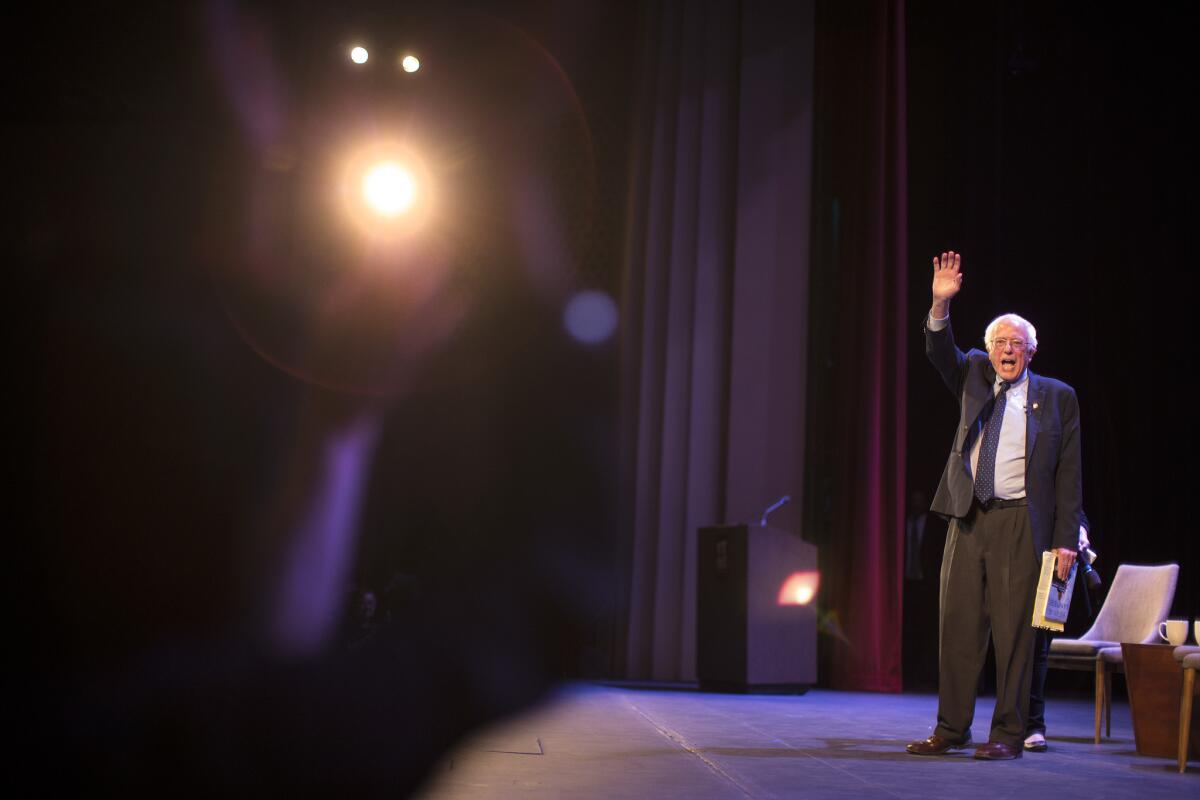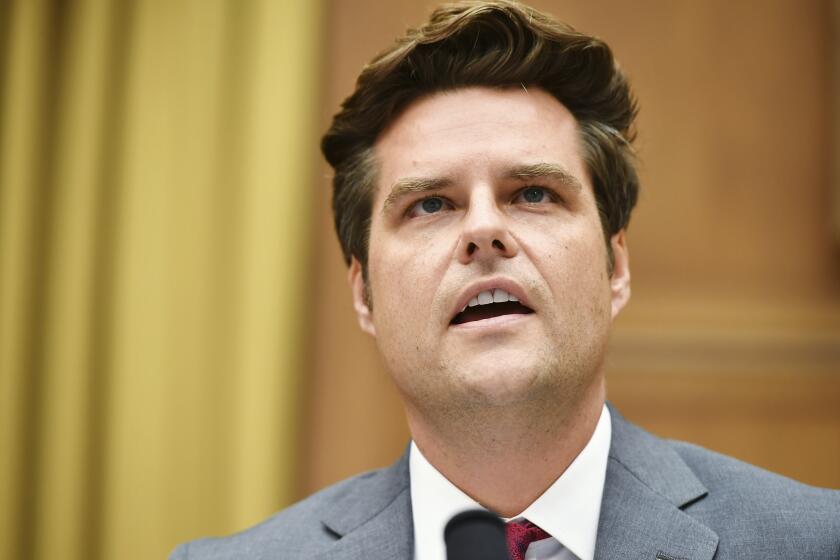Fighting for the progressive cause got a little easier thanks to this Bernie Sanders-affiliated group

Vermont Sen. Bernie Sanders built a fiercely loyal California following during the election, regularly selling out events and packing his rallies with devoted supporters, some of whom trekked to other states on his behalf.
But when the former Democratic presidential candidate’s hopes for the nomination were dashed, Sanders and his allies worked to parlay some of that enthusiasm into electoral success elsewhere, hoping to advance progressive causes and candidates in one of the most liberal states in the nation.
Observers say Sanders made a real impact in the races he boosted directly or indirectly — an organization launched with his blessing raised six-figure sums for some candidates — an effect that could multiply if the movement the senator began continues to grow.
In the run-up to the November election, Sanders endorsed several like-minded state and local candidates in California, including them on fundraising drives that went out to his coveted list of supporters nationwide.
Our Revolution, the political group he started to propel down-ballot candidates to victory, also made a major drive in the state by endorsing a total of 17 ballot measure campaigns and candidates for city council up to Congress.
Its results in California were lukewarm: Of those campaigns, six lost. Among the most high-profile, Proposition 61, a drug-pricing initiative vociferously backed by Sanders went down to defeat as did Jane Kim, who ran for state Senate with Sanders’ backing. But representatives from those campaigns say Sanders and his allies had an outsize impact that helped them stay competitive.
The group counts among its victories a congressional seat won by Nanette Barragan, an Inland Empire Assembly race that elected progressive attorney Eloise Reyes and mayoral races in Berkeley and Stockton.
In the run-up to the November election, Our Revolution raised more than $1.3 million — about 11% of that went to California races.”
SIGN UP for our free Essential Politics newsletter >>
“We were a newborn national organization fighting in 106 candidate races and 35 ballot initiatives,” said Shannon Jackson, executive director of Our Revolution, which launched Aug. 24. “We started out hitting the ground running and we had only 76 days until the general election.”
While Jackson says the group is “completely separate” from Sanders, its stated mission echoes many of the priorities Sanders highlighted in his presidential campaign. While Sanders handed over the reins of the organization to former campaign manager Jeff Weaver after launching it, the group draws on Sanders’ popularity and his vast digital network of supporters to fuel much of its efforts.
“We were born from the Bernie 2016 campaign, and so that’s what we are moving forward with, that energy and trying to make it a legacy and a long-lasting movement,” Jackson said.

Barragan, a former Hermosa Beach councilwoman who was considered an underdog in her race for Congress, scored an endorsement from Our Revolution. She ultimately won by two percentage points against Isadore Hall, a fellow Democrat and state senator.
Her campaign consultants credit Our Revolution’s support with helping her get there.
“They were flying the airplane and building it at the same time, and the airplane flew really well,” said Mike Trujillo, a Democratic consultant for Barragan.
Following the endorsement, Sanders and Our Revolution included Barragan on a handful of fundraising emails to supporters, asking donors to split small donations among various slates of candidates across the country.
In the end, Trujillo said, those combined efforts netted the campaign more than $350,000 in the final weeks of the campaign.
“It was critical,” said Trujillo, who also attributes a noticeable uptick in volunteers to the emails.
The money helped Barragan’s campaign open a second office, hire more staff and increase its advertising buys through Election Day. The six-figure total came from more than 45,000 individual donations from all over the country, an average of $6.22 a contribution.
Kim, who embraced Sanders’ call for free college tuition in her race for state Senate, endorsed Sanders in the presidential primary and received his support in return.
Sanders, who campaigned for Kim several times, helped her stay competitive in her race against Scott Wiener, a well-funded opponent widely seen as the more business-friendly Democrat.
In total, Wiener and the independent expenditures supporting him outspent Kim and her allies by more than $2 million.
“When you are being outspent at that kind of ferocious pace, to wake up in the morning and realize, ‘Wait a minute, we’re getting a lot of small contributions today,’…it’s definitely Christmas in October,” said Eric Jaye, whose firm, Storefront Political, worked on Kim’s campaign.
Overall, emails sent by the Sanders campaign and Our Revolution raised about $180,000 for Kim, much of it in odd denominations of $2.46 or $4.55 because of the way both groups fundraised for multiple candidates at a time.
Kim ultimately lost by three percentage points, but Jaye says the support Sanders and Our Revolution lent to her campaign was “tremendously helpful.”
“Was it enough to make up the difference? No,” Jaye said. “But it was a potential model of how a mass citizens’ movement might create greater parity in this political system that’s awash with cash.”
During the campaign for Proposition 61, which Sanders stumped for repeatedly and which was similarly pitched as a David and Goliath-style battle, Our Revolution’s main role was in encouraging its supporters to turn out to rallies up and down the state.
Michael Weinstein, president of the Los Angeles-based AIDS Healthcare Foundation, which sponsored the measure, said the crowds were “extremely energized and enthusiastic” supporters of Sanders.
“What I’ve seen since the election is his full-throated endorsement of continuing to build that movement,” Weinstein said. “How many people will answer that call and what will it become? No one can know. But I think it’s been off to a great start.”
As it looks toward the 2018 and 2020 elections, the group hopes to establish state-based chapters that can steer priorities locally, Jackson said. Responding to earlier controversy over the group being founded as a 501(c)(4) nonprofit, which critics said ran counter to Sanders’ opposition against allowing unlimited money in politics, its board has promised to disclose all donors giving more than $250. It also plans to create a political action committee that would allow more direct coordination with down-ticket candidates.
Eventually, Jackson said, Our Revolution would like to move beyond email fundraising and provide more organization and training for candidates and activists alike.
And, he adds, California will continue to be a major focus for the Washington, D.C.-based group, in part because the top-two primary system and the dominance of the Democratic party in the state provides a clearer path for a progressive resurgence.
“I like that it is an opportunity for more progressive candidates to go against the moderate Democrats. It’s the responsibility of…the Bernie Nation to make sure that those candidates are supported.”
Jaye predicts that as left-leaning activists dig in their heels against a Trump administration, movements like Sanders’ will become even more important.
“The threats are so acute and the Democratic Party establishment on some levels is under such pressure that these movements, I think, will continue to go forward and will have a greater impact in the next election,” Jaye said. “The idea of ‘Our Revolution’ putting something out there that Bernie Sanders would want you to do, it’s a powerful thing.”
For more on California politics, follow @cmaiduc.
ALSO:
Sanders creates group to continue ‘Our Revolution’
This is Bernie Sanders’ plan to lead Democrats out of the wilderness
Updates on California politics
More to Read
Get the L.A. Times Politics newsletter
Deeply reported insights into legislation, politics and policy from Sacramento, Washington and beyond. In your inbox three times per week.
You may occasionally receive promotional content from the Los Angeles Times.











